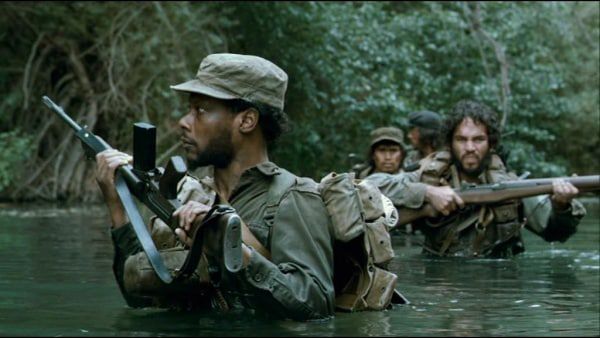Eye For Film >> Movies >> Che: Guerilla (2008) Film Review
Che: Guerilla
Reviewed by: Chris

Neatly skipping over everything from the coup in Cuba to his undercover entry into Bolivia, part two of Soderbergh’s portrayal of Che Guevara describes a tragic hero. As with Che: Part One, this rambling guerrilla warfare escapade through the colourful mountains of Bolivia is probably destined to disappoint more people than it will satisfy, so why was the film (and particularly Benicio Del Toro’s performance) so loudly praised at Cannes?
James Rocchi, for instance, called it a work of art that's “not just the story of a revolutionary” but “a revolution in and of itself.” The Guardian’s Peter Bradshaw called it a “flawed masterpiece.” I return to my original contention about Part One – that its value lies in its depiction of a hero figure. And in an age when there is a surfeit of poor hero role-models, could it not be salutary to see a strongly honourable one, even if stripped of some of the less endearing episodes of his life?

This is the psychological hero enshrined by the great Scottish essayist, Thomas Carlyle, in his seminal book Heroes And Hero Worship. Heroes can be real or imaginary (or somewhere in-between), but should genuinely inspire us toward higher goals, a higher purpose. Compare this with the unrealistic ‘heroes’ of standard Western storytelling, where a person undergoes trials and tribulations before obtaining a barely-believable reward – usually everlasting love or material wealth – as if by divine studio intervention. Real heroes have an excess of moral courage – not Lost Ark dare-devilishness or James Bond super-toys. They rise, and empower others to rise, to be the best that they can be. In Part One, Che succeeds. In Part Two, he fails. It is not for want of moral courage but since a) not all good plans can succeed and b) being human, mistakes are inevitable.
Guevara’s intellectual clarity is flawed when he equates conditions that justify armed struggle with conditions that make that armed struggle able to succeed. It is a serious miscalculation.
High in the mountains near La Paz, the colours are breathtaking. There is an air of mise-en-scene authenticity that was occasionally lacking in Che: Part One (the U.S. would not allow Soderbergh to film in Cuba). Visual treats are heightened by maximising natural light and the extreme flexibility and realism offered with groundbreaking RED cameras. This is a high performance digital cine camera with the quality of 35mm film and the convenience of pure digital. Designed for flexibility and functionality, the package weighs a mere 9 lbs. “Shooting with RED is like hearing the Beatles for the first time,” says Soderbergh. “RED sees the way I see... so organic, so beautifully attuned to that most natural of phenomena – light.”
If Che had stopped with the successful Cuban revolution it would have enshrouded him with an almost mystical invincibility. That he failed in Bolivia showed not only that he had human limitations but that it is his moral virtues that are remembered, not the political triumph. Critics will say – and with some justification - that his armed struggle inspired far less noble characters to achieve tin-pot dictatorships. His development of guerrilla fighting tactics is not good or bad in itself (and has since been used for both).
But for all its praiseworthiness, this film often seems to lack dramatic and narrative tension. We stumble from one escapade to another, knowing that Che will eventually meet his death. I found myself glancing at my watch and thinking it could have been shorter. But the work that has gone into this – interviews with people from all sides and even getting one of Guevara’s ex-comrades to coach actors on the minutiae of the Bolivian operations – make the film a commendable achievement. It might not be top-flight entertainment, but it demonstrates integrity in documenting a significant slice of history.
There is also another very important point in the Che ‘hero’ figure here. It’s about failure. That if you try your utmost, even if you fail, your effort will not have been in vain because it may give others hope and moral courage. One could cynically call it a ‘martyr’ complex, and it is found, of course, in many religious figures as well. But Che does not ‘sacrifice’ himself. He does what he does best, to the best of his not inconsiderable ability, and so provides an example. Success or failure in any particular instance becomes a mere detail.
Given the U.S.’s longstanding and illegal blockade of Cuba, I am tempted to write that Che Parts 1 & 2 are too good to be wasted on the U.S. But that would be to invite a contention that the film has sought earnestly to avoid. One must hope that many viewers will be prepared to view Che without politics and the bias that inevitably engenders. Whatever its faults, it rehabilitates Soderbergh after the populist nonsense of Ocean's Eleven.
Reviewed on: 02 Jan 2009



















